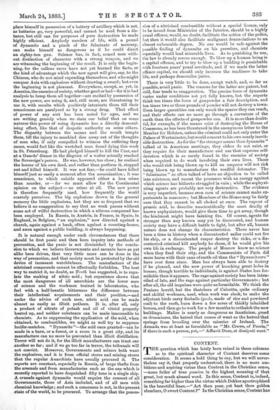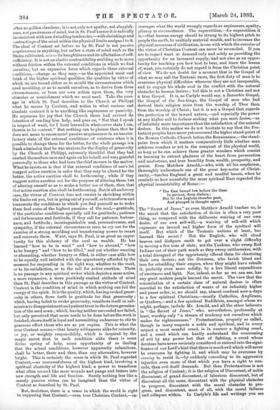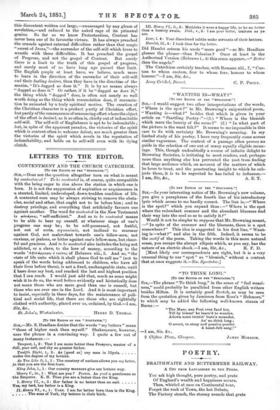CONTENT.
THEquestion which has lately been raised in these columns as to the spiritual character of Content deserves some consideration. It seems a bold thing to say, but we will never- theless say it, that properly understood, there is no more am- bitious and aspiring virtue than Content in the Christian sense, —none fuller of true passion in the highest meaning of that great, but much abused word. In this sense, Content is, indeed, something far higher than the virtue which Dekker apostrophised in the beautiful lines,—" Art thou poor, yet hast thou golden slumbers, 0 sweet Content ?" In the Christian sense, Content has often no golden slumbers; it is not only not apathy, not sluggish- ness, not passiveness of mind, but in St. Paul's sense it is radically inconsistent with any dwindling tendencies,—with shrinkings and contractings of the mind within the physical limits assigned to it. The ideal of Content set before us by St. Paul is not passive acquiescence in anything, but rather a state of mind such as the Stoics cultivated, minus its haughtiness and its affectation of self- sufficiency. It is not an elastic contractibility enabling us to move without friction within the external conditions in which we find ourselves, but an expansive force which regards these external conditions,—change as they may,—as the appointed meat and drink of the higher spiritual qualities, the qualities by virtue of which we are bound either so to mould the circumstances which need moulding, or so to mould ourselves, as to derive from these circumstances, or from our own action upon them, the very stimulus or nourishment which we most need. Take the pass- age in which St. Paul describes to the Church at Philippi what he means by Content, and notice in what curious and absolute contrast it is to anything like supineness or passivity. He expresses his joy that the Church there had revived its intention of sending him help, and goes on, "Not that I speak in respect of want, for I have learned in whatsoever state I am, therein to be content." But nothing can be plainer than that he does not mean to recommend passive acquiescence in an unsatis- factory state of the external conditions of existence when it is possible to change them for the better, for the whole passage is a frank admission that he was anxious for the display of generosity by the Church at Philippi, extremely thankful that they had exerted themselves once and again on his behalf, and very grateful personally to those who had been the chief movers in the matter. What he insists on is that if the external conditions of one's lot suggest active exertion in order that they may be altered for the better, the active exertion shall be forthcoming ; while if they suggest active exertion not for the purpose of altering them, but of altering oneself so as to make a better use of them, then that that active exertion also shall be forthcoming. Butin all and every case, the virtue of Content does not consist in shrinking within the limits set you, but in going out of yourself, so to transform and transmute the conditions in which you find yourself as to make them feed some of the highest passions of the soul,—gratitude, if the particular conditions specially call for gratitude; patience and forbearance and fortitude, if they call for patience, forbear- ance, and fortitude ; inextinguishable zeal, persuasiveness, and sympathy, if the external circumstances seem to cry out for the exercise of a strong moulding and transforming power to recast and renovate them. Want, says St. Paul, is as great an oppor- tunity for this alchemy of the soul as wealth. He has -learned " how to be in want " and " how to abound," "bow to be hungry" and "how to be filled," and yet whether wanting or abounding, whether hungry or filled, in either case alike how to be equally well satisfied with the opportunity afforded by the moment for responding in the right way, whether to the want, or to its satisfaction, or to the call for active exertion. There is no passage in any spiritual writer which depicts a more active, a more expansive, a more positively exalted attitude of mind than St. Paul describes in this passage as the virtue of Content. Content is the condition of mind in which nothing can foil the energy of the spirit. It is the quality, which, having evoked gener- osity in others, flows forth in gratitude for that generosity ; which, having failed to evoke generosity, manifests itself in sub- mission to disappointment and patient trust in the future germina- tion of the seed sown ; which, having neither succeeded nor failed, but only perceived that more needs to be done before the work is finished, shows itself in loyal and unremitting endeavour to stir to generous effort those who are as yet supine. This is what the true Content means,—that hearty willingness alike for calamity, or joy, or weighty responsibility, which is inspired by the magic secret that in each condition alike there is some divine spring of help, some opportunity of so dealing that the actual conditions, however apparently calamitous, shall be better, there and then, than any alternative, however bright. This is certainly the sense in which St. Paul regarded Content,—as resourcefulness of the highest kind, involving a spiritual elasticity of the highest kind, a power to transform what often seemed like mere wounds and pangs and fetters into new strength and life and freedom. Surely nothing less like a merely passive virtue can be imagined than the virtue of Content as described by St. Paul.
But, doubtless, there is a sense in which the world is right in supposing that Content,—even true Christian Content,—en- courages what the world wrongly regards as supineness, apathy, pliancy to circumstance. The superstition,—for superstition it is,—that human energy should be strung to its highest pitch to people the earth, to multiply material wealth, and to increase the physical resources of civilisation, is one with which the exercise of the virtue of Christian Content can never be reconciled. If you are to regard want or demand only and solely as providing the opportunity for an increased supply, and not also as an oppor- tunity for teaching you how best to bear, and learn the lesson of, want, you certainly do not regard it from the Christian point of view. We do not doubt for a moment that in the Gospel of what we may call the Teutonic races, the first duty of man is to overcome physical difficulties wherever they are not insuperable, and to engage his whole soul in the conflict with the natural obstacles to human desires ; but this is not a Christian and not a true Gospel. It is, as Carlyle would say, a Berserkir Gospel, the Gospel of the Sea-kings, the Gospel of men who had derived their religion more from the worship of Thor than from the worship of Christ; but it is not a Gospel that regards the perfection of the inward nature,—and especially the power at any higher call to forbear seeking what you most desire,—as of infinitely more importance than the satisfaction of the natural desires. In this matter we do not hesitate to say that the Pro- testant peoples have never yet recovered the higher stand-point of the Roman Catholic Church before the Renaissance,—the stand- point from which it matters comparatively little whether man achieves wonders or not in the conquest of the physical world, so long as be can achieve those greater wonders which consist in learning to extract gladness of the heart from persecution and misfortune, and true humility from wealth, prosperity, and praise. Even Matthew Arnold,—who, with all his scepticism, thoroughly understands one of the great key-notes of Christ- ianity,—teaches England a great and needful lesson, when he
reminds us how scornfully the more spiritual East regarded the physical irresistibility of Rome:— "The East bowed low before the blast In patient, deep disdain ;
She let the Legions thunder past, And plunged in thought again."
The " Secret of Jesus," as even Matthew Arnold teaches us, is the secret that the satisfaction of desire is often a very poor thing, as compared with the deliberate waiving of our own desire, of our own self-will, —a waiving of sell-will which
expresses an inward and higher form of the spiritual will itself. But which of the Teutonic nations at least, has learned this secret ? Not the English, who will cloud heaven and disfigure earth to get over a slight difficulty
in moving a few tons of slate ; not the Yankees, who sweep Red Indians out of their path much as they sweep rattlesnakes, with a total disregard of the opportunity offered them for chastising their own desires ; not the Germans, who lavish blood and iron for rebuilding their empire, when they might have rebuilt it, probably even more solidly, by a less liberal expenditure of sweetness and light. Nor, indeed, so far as we can see, has any great modern people learned the secret. The view that the renunciation of a certain class of natural desires is often essential to the satisfaction of wants of an infinitely higher and purer order, is; we should say, almost confined now-a-days to a few spiritual Christians,—mostly Catholics, Anglicans, or Qaakers,—and a few spiritual Buddhists, amongst whom we might, perhaps, include Mr. Arnold, and all the other believers in "the Secret of Jesus," who, nevertheless, professedly at least, worship only " a stream of tendency not ourselves which makes for righteousness." Protestantism, properly so called, though in many respects a noble and spiritual, and in every respect a most manful creed, is in essence a fighting creed, and a creed which can hardly understand the overcoming of evil by any power but that of fighting, a creed whose devotees have never seriously considered or entered into the signi- ficance of our Lord's hint that there is much evil which will never be overcome by fighting it, and which may be overcome by ceasing to resist it,—by soddenly conceding to its aggressive injustice even more of that which you have a right to con- cede, than evil itself demands. But then Protestantism is not the religion of Content; it is the religion of Discontent, of noble discontent, of grand discontent, of laborious discontent, but of discontent all the same, discontent with the physical obstacles to progress, discontent with the moral obstacles to pro- gress, and discontent, most of all, with the moral failures and collapses within. In Carlyle's life and writings you see this discontent written out large,—nnassuaged by any gleam of revelation,—and reduced to the naked rage of its primeval -genius. So far as we know Protestantism, Content has never been one of its favourite virtues. It has always preached -the crusade against external difficulties rather than that magic
secret of Jesus,"—the surrender of the self-will which loves to wrestle with these difficulties. It has preached the gospel -of Progress, and not the gospel of Content. But surely there is a limit to the truth of this gospel of progress, and surely most of us have long ago passed that limit. The English people at least have, we believe, much more to learn in the direction of the surrender of their self-will and their darling desires, than they have in the direction of the maxim, "It's dogged as does it." It is by no means always "" dogged as does it." Or rather, if it be " dogged as does it," the thing which " dogged " does, is often not nearly so well worth doing as the thing which renunciation does, if renuncia- tion be animated by a truly spiritual motive. The creation of -the Christian character is a product partly of Christian effort, but partly of the consequence of renouncing effort where the object of the effort is desired, as it so often is, chiefly out of indomitable -self-will. The self-will of Englishmen is apt to be indomitable ; .but, in spite of the apparent paradox, the victories of the spirit which is content often to welcome defeat, are much greater than the victories of the spirit which revels in the reputation of indomitability, and holds on to self-will even with its dying




































 Previous page
Previous page